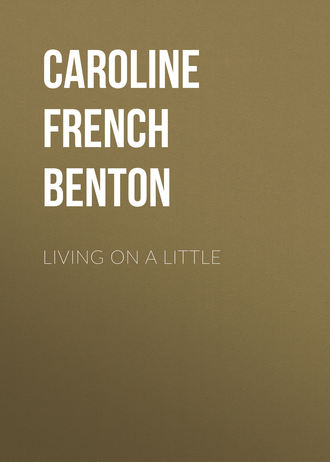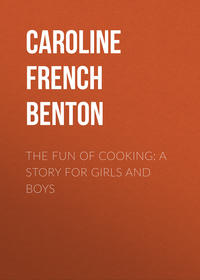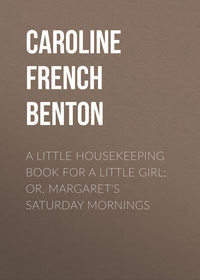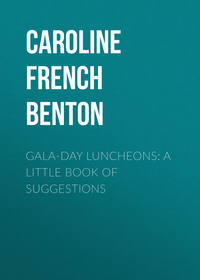 полная версия
полная версияLiving on a Little
"It was that horrid asparagus. Why did you let me buy it, Dolly? I am truly sorry I did, for like you, I suspect we have spent too much. Let us see.
"Strawberries – a whole box this time. Luckily they are cheaper, however; they cost .10. The soup was much as before: left-over beets and three quarters of a quart of milk; put down .06. Salmon, one can,25; peas, one can,15; potatoes, only .05, thank goodness! Asparagus,30, and right in the height of the season, too; it's absurd. Lettuce,05. Parfait, say,20. So, allowing a margin as before, it was about $1.30. Oh, well, that is not as bad as I feared. Six people, too! But then, this time we had almonds left over, and Dick gave me the chocolates we had on the table. We must be careful, anyway, even if this once we have not overrun."
The third luncheon again had but six guests, as Dolly was perfectly sure she could not wait on more. This time they were gay young women who were accustomed to all sorts of elaborate functions, and Dolly secretly dreaded her part. They, however thought it great fun to go to an informal meal cooked by one sister and served by another, and eat few and simple dishes beautifully cooked; so far from criticizing, they rather envied the two hostesses their ability to carry off the affair with ease and charm.
The menu was planned very thoughtfully. They wanted things rather prettier than ever, and yet they must avoid extravagance. They decided on this:
Bouillon with whipped creamCreamed fishChicken croquettes; creamed peas; potatoes; chocolate with marshmallowsPineapple salad, cream cheese and wafersVanilla mousse with strawberries"Five courses," commented Dolly as the last was set down. "And chicken croquettes! I call that elegance."
"Five courses, because we omitted the fruit before the soup, as we had it before, and because fish is cheap and makes a good second course; it sounds more elaborate than it really is. Now for our table: do you suppose we could get some violets from the country? They make such a lovely centrepiece."
"Of course we can. Let's ask the milkman to get us some."
This proved a lucky thought, for the milkman had a small boy who promised to get a quantity of wood violets and send them in early in the morning by his father all tied up in bunches, and all for twenty-five cents. Of course these were not fragrant like hothouse violets, but they had quite as beautiful a color. A lovely table was arranged with a low basket of the violets edged with a heavy band of their own leaves; a couple of small glass dishes held some violet-colored candies, and the finger-bowls which came on with the dessert had a couple of violets in each, so that the effect of the meal was springlike.
The bouillon was made the day before it was needed, out of bones and odds and ends of meat; it was clarified, colored a good brown with kitchen bouquet, and well seasoned. The spoonful of whipped cream on the hot soup gave a touch of richness to it.
The fish was merely a little plain fresh cod, boiled the day before the luncheon, then picked up in the morning, mixed with white sauce, put in individual dishes, with crumbs on top, and browned in the oven. The croquettes were made out of a small-sized can of chicken of the best brand. This was a genuine stroke of economy, for the cost was just half of what the very toughest and oldest fowl would have been. By taking it out of the tin in good season, picking it up and letting it lie in the air till the oxygen lost in canning had been re-absorbed, its flavor was largely restored, and when the croquettes were made and came to the table, golden brown without, creamy within and deliciously seasoned, no one suspected the artifice used in making them. They were served with the peas and potato as before; peas were a staple for luncheon, Mrs. Thorne thought. This time the potatoes were not creamed, however, but cut in balls with a cutter and dropped in fat till they were browned.
Instead of tea with this course, there was chocolate, served from the pot on the table, and in each cup was dropped, last of all, one marshmallow, which puffed and melted in the steaming heat and gave a delightful flavor.
After this course, instead of exchanging the plates for others filled with salad, Dolly altered the plan of service. She took off all the plates and left the table bare. Then she set on the salad in front of her sister; it was so pretty that she wished every one to see it.
They had bought two pineapples, which were cheap just then. One was of moderate size, and the other the very smallest they could find; a perfect baby of a pineapple. The larger one had been peeled, picked up in bits and laid on lettuce on a flat glass dish. The little one was not peeled, but had its brush cut off with a slice from the top; the centre was scooped out till only a shell remained, and this was wiped dry and filled with a stiff mayonnaise; the brush was put on again, and the pineapple put on a plate with the ladle by its side. In serving, Mary put a portion of the lettuce and pineapple on a plate, and removed the cover of the new mayonnaise dish by lifting it by the brush and laying it on the plate; then she added a spoonful of mayonnaise, and Dolly passed the plates for her. This salad was a great success.
Last of all came the vanilla mousse, each glass topped by a big strawberry. A few berries had also been sliced and mixed with the mousse as she put it in the glasses.
"That was the best luncheon yet," said Dolly as they discussed the affair. "Really, I was proud of the table it was so pretty with those violets. I don't know why it is, but lay a table with pretty white doilies and put on violets, and somehow it has a most gorgeous appearance. Then the luncheon itself was good, thanks to your cooking, Mary; I would not have been ashamed to have had anybody in the world drop in – not even a queen! Now what did it cost?"
"The flowers,25," figured Mrs. Thorne aloud, writing it down as she did so. "Soup, about .05; I have been saving bones for that for days. Fish, half a pound,09; chicken,25; peas and potatoes,20; chocolate and marshmallows, about .10. Salad, two pineapples, one .15 and one .05, and lettuce and mayonnaise, about .30; mousse and berries, – half a box of berries, – about .20. Then almonds and candies and crackers, and the little margin bring it up to, say $1.75. That is much more, Dolly, than we have spent yet."
"Yes, but it's the last one of the season, and think how good it all was!"
"I know, but if we were going on we should have to cut down on things. However, I don't mind this once, as we had money enough for it. Now while you have your book there, do you not think it would be a good idea to write out some more possible luncheons like those we have had, and average the price, so you can have some sort of a guide to go by? We can easily make out some menus for each season in the year, since you are so determined to have them right along."
"Blessings on you for the thought! Begin right away."
"First copy out those we have had and mark them Spring, while I go out and start the family meal that comes next. I have bread to mix, for one thing, so give me time enough."
"Four minutes is plenty for that; I'll give you just five."
When they were ready, the list began with a very simple one first, headed Summer:
Cream of corn soupFrenched chops; purée of cucumber; potato croquettes; iced teaLettuce with peppers stuffed with string-beans; cheese ballsGinger ice"Just make a memorandum of that cucumber purée," said Mary as Dolly finished. "You cook the cucumbers soft in just a tiny bit of water; then season well, put them through the sieve, and serve very hot, a spoonful on each plate. It is very good indeed. The salad, too, is nice. Fill green pepper shells with tiny cooked beans, and pour French dressing over; on top of each put one white cream cheese ball, and stand on a lettuce leaf. The ice is just a plain lemon water ice, with preserved ginger cut up in it."
"Now the next one," said Dolly.
"Well, suppose we have two for each season. This will do for another summer one:
"Cubes of watermelon in glassesSoft shell crabs; fried tomatoes; potatoesYellow tomato salad on lettuceRaspberry ice; sponge cakeIced coffee.""Suppose you can't get crabs; what do you do then?"
"Tell the grocer to order them for you in tins; they come with the shells thrown in at about thirty or forty cents a big can, which holds enough for a whole family. Instead of having the soft-shelled crabs fried, devil the canned meat and serve in the shells; it's perfectly delicious."
"And whatever is yellow tomato salad? I never ate such a thing."
"Don't you know those little pear-shaped yellow tomatoes you see in summer? You scald those and skin them, chill them well, lay them on lettuce, and put on French dressing. Or, you can have mayonnaise with them, if you like. It's a nice change from the usual salad, and it will not interfere with your having fried tomatoes with the main course, for they neither look or taste alike."
"Very well; now the next one."
"Mark this Autumn. Suppose we have melons first;
"Little melons, halvedTomato bisqueStrips of veal, breaded; creamed chestnuts; spiced peaches; coffeeSalad of red peppers filled with cauliflowerPêche Melba"Cut the melons in halves, Dolly, and chill them, but mind you don't put ice inside, to make them watery and horrid. And pick out little melons, spicy green ones. Get the big Italian chestnuts to serve with the veal, if you can. Cook and peel them, and leave the inside skins on; then just cream them. If you can't get those, use ordinary ones, and put them through the sieve like a purée; they taste just as well. The salad is very pretty. Cut the tops off the red peppers and take out the inside exactly as you did with the green ones; cook the cauliflower, pick it up in flowerets, and mix with French dressing and fill the peppers. If you wish to be perfectly grand, cook a carrot, cut it up into tiny dice, and put a few on top of each; the colors are lovely together. Serve these on lettuce, of course. Then the dessert. Halve nice peaches, peel them, and put one half on a round of sponge cake for each person. Fill the middle with a spoonful of plain ice-cream, and add a little bit of candied cherry if you have any."
"One more for Autumn; two for each season except Spring, – I have three for that," said Dolly complacently.
"Try this:
"Cream of Lima bean soupFilets of fish; white sauce; potato balls; stuffed tomatoesLettuce and grape saladFrozen peachesCoffee"That needs no explaining, I am sure. Have sauce tartare instead of white sauce with the fish if you can afford it, Dolly, for it's better. And serve the peaches in glasses, just a little to each person; they will be cheap, anyway, at that time of year. Now for winter; that is the most difficult time to entertain in, to my thinking."
"Still, we must entertain," said Dolly inflexibly.
"Then try this:
"Clam soupCreamed chicken; peas in crusts; sweet potato puff; teaCelery and nut salad with mayonnaiseLittle cakes filled with ice-cream.""Very good! And as I can make all those things, go right on while the inspiration holds."
"BouillonFried oysters with sauce tartare; French fried potatoes; creamed celeryBanana and peanut saladChocolate mousseCoffee.""How do you make that salad?"
"Peel the bananas and cut them in halves crosswise; cut off also the pointed end to make each one look like a croquette; then roll them in chopped peanuts and lay them on lettuce. Pass mayonnaise with them."
"That's easy enough," Dolly said as she scribbled it down. "And that is the whole set already. I wish you would go on and do me a lot more, Mary; you do them like a lightning calculator."
"Why did I go to all the trouble to teach you that Game of Menus, I'd like to know, if this is the result? Not another one will I furnish you; just write out a lot yourself."
"Well, but don't rush away like that! Tell me how much these are going to cost?"
"I planned for a dollar and a quarter apiece for six people. That leaves a margin, and you can put as much or as little in addition in flowers and such extravagances as you choose. I do not think any luncheon will cost more than my estimate; if it does, I'll pay the difference."
"Then I'm certain it will not cost one cent more," said Dolly with decision. "That remark settles the matter for me. I know too well you would never make the offer if you were not sure and certain."
CHAPTER XII
In the Country
"A letter from Aunt Maria," said Mr. Thorne, who had met the postman at the door at breakfast time. "Dear old lady! I wonder whether she can be coming to make us a good long visit."
His wife looked up from the coffee cups with dismay. "Don't suggest such a thing," she remonstrated. "Remember that last three months visit. Of course she will not come again for years."
Dolly looked inquiringly at her sister. "Aunt Maria? I think I recall something about a visit from such a relative."
"Of course you do," said her brother. "She came and found Mary was keeping house all wrong, and kindly tried to show her how it should be done. She insisted on boiled dinners and pie for me at night, and doughnuts every morning for breakfast. When at last she showed signs of getting ready to go home, I entreated her to stay longer, and it is my fondest dream to have her back; indeed, I want her to make her home with us permanently."
"Do hurry up and read the letter, Dick. If she says she is coming here, I warn you in advance that Dolly can keep house. I shall go off and make some visits."
After a brief glance at the page Mr. Thorne waved the letter about his head. "Glory, glory!" he chanted. "Listen to this and think shame to your inhospitable selves.
"'My dear Nephew: – I have decided to go West and spend the summer with your great-aunt Eliza. I write to say that, as I do not care to close the cottage, I shall be pleased to have you and Mary spend two or three months in it. I recall that though your ways of keeping house in the city seemed strange to me, still Mary did have things tidy, so I am quite willing to have her here in my absence. I shall go next week, and you can come any time after that. My regards to your wife.
"'Your affectionate aunt,"'Maria Hancock.'"Mary beamed as she listened. "Dear old thing," she said when her husband laid down the letter; "there's a reward for all my sufferings while she was here. Dolly, she has a darling little house only an hour's ride from town; and a garden, my dear, a garden! We can have a lovely cool time all summer, and eat our own vegetables. Think of it."
"Yes, Dolly, I seem to smell the delicious, soul-satisfying odor of those onions now," said Dick, luxuriously closing his eyes. "Young ones, Dolly, strong and spicy. We shall have them for breakfast in the morning and for dinner at night, and I shall have a light lunch of them with bread and butter at bedtime; there's nothing like onions for insomnia. Sundays, of course, I shall have them four times. Dear, dear Aunt Maria!"
"Hush, Dick; don't spoil all our pleasure with such horrid suggestions. Is it really a nice place, Mary?"
"Nice! It's heavenly. Not much society, you know, just a plain little country village, but cool and lovely. We will wear our oldest gowns, and do up fruit, and have our breakfasts on the porch, and just revel."
"Cherry pie," murmured Mr. Thorne, who was apparently eating his breakfast in a sort of waking dream. "And apple pie; rhubarb pie, too, and currant pie; strawberry pie and gooseberry pie also. Dear Aunt Maria!"
"You can cut the grass nights after you get home, Dick," said his wife; "and you can get up early and pull the weeds in the garden and water things. And on half-holidays you can saw wood; I remember Aunt Maria said she had a wood-stove. It will give you just the exercise you need, and be a pleasant change for you from office work."
"Mary," said Dick, rising suddenly from the table, "don't detain me with such frivolous ideas when I am in such a hurry as I am in this morning. However, I must pause long enough to say that I am to have extra hours this summer, and no half-holidays, so that it will not do for you to depend upon me to pull weeds or cut grass. You had better plan to do those little things yourselves."
"He may joke all he likes," smiled his wife as the dining-room door closed after her husband, "but he is as delighted as we are over the prospect. We will go the very minute Aunt Maria leaves the house. It seems as though I couldn't wait till then."
In ten days the little apartment was ready to be closed for the summer and the trunks stood in the hallway. Mrs. Thorne was taking a parting glance all around.
"I have just one regret in leaving," she said to Dolly. "That is, that we have had no time to try and sub-let this place. I have known ever so many people who went away in summer and rented their apartments to people who wanted to come to the city and study in the college or take a course in art, or something of the sort. Often you can find half a dozen nice girls who want to do their own housekeeping in a furnished flat, and then, you see, I would have let them have this for exactly the same rent as we pay and so have saved a lot. Of course, as we do not pay rent in the country, there is no additional expense, but still I cannot help mourning over the 'might have been.' Remember, Dolly, to try and get a good tenant when you move out temporarily."
By afternoon of the next day the family was settled in the little cottage. It was a plain, old house with a low roof, and the furnishings were largely of hair-cloth, and the pictures enlarged crayon portraits of deceased relatives, or wreaths of wax flowers encased in glass. Still, the porch was shaded with vines, and the flowers grew luxuriantly in the little yard in front, and back of the house was what Mary declared was "a perfect dream" of a vegetable garden, with rows of currant and raspberry bushes along the fence and a group of fruit trees in a tiny orchard further off. Altogether, it was just what filled their needs.
"The kitchen, however, does not suit me a bit," declared Dolly after the rest of the house had been examined and pronounced quite comfortable, and roomy enough for a servantless ménage.
"Well, it isn't up to our modern notions, to be sure," said her sister, looking critically around. "Everything is as clean as wax, as I had expected, but an unpainted sink needs lots of scrubbing, and a wood-stove needs blacking, and also constant stoking. Dear me, how horrid it is to have to burn wood after gas! But never mind; I ought to be ashamed to say such a thing in view of our mercies. Keep your mind on the garden, Dolly, and such things as scrubbing will be forgotten."
"And no bread-mixer," Dolly went on, investigating the pantry shelves, "and no egg-beater and no cream-whipper! My dear, we must pack up our trunks and go straight back to town. We will be worn to a frazzle in a week working in Aunt Maria's ways."
"Don't worry," said Mrs. Thorne placidly. "Those things are all in the big barrel I packed while you were off shopping day before yesterday. I forgot to tell you. I knew we would have to eke out in such things. As to the bread-mixer, one of my unpardonable sins, in Aunt Maria's eyes, was that I made bread in one, so I knew in advance that I must bring mine along."
"And did you buy a kerosene-stove, too?"
"Yes, I did! I was going to surprise you with it, however, and I wish you hadn't asked. I just boldly took the price out of Incidentals, knowing that we should save mints of money on vegetables this summer and I could put the amount back on our return to town in September."
"And all those groans over the stove-stoking we were going to do were words, idle words!"
Mrs. Thorne laughed gaily. "Just low comedy," she said. "And now for our meals. What shall we have for dinner to-night? We shall have to go down-town and buy some butter and eggs and coffee and such things, and bring them back, too; we must not expect city service here."
They decided that this first night it would be foolish to try and have a regular dinner, so when Mr. Thorne came home he found a supper table set out on the porch, and a little meal arranged of parsley omelet, creamed potatoes, and coffee, followed by strawberries and cream. It was the very poetry of living to sit leisurely in the growing dusk under the vines and listen to the soft country noises. The family then and there decided to take their meals out-of-doors all summer.
"The neighbors will think we are crazy," said Mr. Thorne placidly. "They will write to Aunt Maria and tell her we are disgracing her hearthstone. No well conducted villagers would think of doing such a thing as eating on a porch when there was a dining-room with a black walnut table and six chairs in their proper places. They will not consider us respectable, my dears!"
"I can't help it if they don't like it, and I don't believe it would surprise Aunt Maria in the least if she heard of it; I think she would say she had no doubt I was quite capable of doing something even as outlandish as this. But in spite of everything, we certainly shall have our meals out-of-doors except on blazing hot noons, and on rainy nights. So there!"
Mr. Thorne was entirely right in the estimation put on the family by the neighbors, but nevertheless they ate, and rejoiced that they could eat under the vines on the porch all summer long.
The second day they took account of what their garden could be depended on to give them. They found string-beans in plenty, radishes, potatoes, spinach and beets. Lettuce was almost ready; peas and corn progressing nicely, and later on there would be cucumbers and tomatoes and eggplant. Last of all, squashes and melons might be looked for. They could scarcely believe all this wealth was to be theirs for the picking.
"But the weeding, don't forget that!" said Dolly, as she heard her sister's exclamation. "I somehow don't seem to fancy the idea of weeding this place. At least, I don't yearn to begin."
"I think we had better have a regular weeding boy; we can pay him in vegetables."
"He will not take them; everybody has vegetables here."
"Then we will pay him in dollars and cents, – mostly cents. Of course we can't do the weeding ourselves, except casually and at odd minutes, and I foresee that Dick will never do a bit. I shall take the money out of what we would spend on food at home, our dollar a day. Weeding is a legitimate expense, but you know how I hate to break into Incidentals, and we can easily save here."
"There's the washing and ironing, remember. You have got to pay for those, you know. I wonder whether they will be a great deal here."
"Those will be less than in town; we can have the wash-lady scrub up the floors too."
"And there is milk."
"That will be less, too. In town we have to pay eight cents a bottle, and in some places it is more than that; here, I fancy, it will be about six cents a quart."
"And there is ice; or do they use ice in the country?"
"Yes, they cut it on the river near here; but it is not always good or abundant. I rather think we cannot use it recklessly; I have known the supply to give out in the middle of the summer when there was a short crop cut."
"And is it cheap?"
"About as much as in town, I think; that is the way usually."
"What do you think about meat? Did you see the butcher shop when we came up from the station?"
"Yes, and I did not like its looks a bit better than I see you did. But perhaps we need not buy our meat there, if we do not like it better when we go inside and look around. There may be a meat-wagon that comes around."
"I think meat-wagons are horrid; they are never clean."
"Not to our city eyes, you mean. Well, we shall see. Perhaps there is a model cart with everything spick and span, and driver in a white jacket; who knows?"
One morning, when they had quite settled down to housekeeping, Mary got out the best preserving-kettle, after the breakfast dishes were done, and presently the weeding boy appeared with a big basket of strawberries which had been ordered the day before, as the garden bed must not be entirely picked off.
"Now for some delicious strawberry preserves," the cook observed as she began vigorously to stem them. "Get out my book, Dolly, and copy down for yourself that recipe marked 'Strawberries; unfailing.' I got it from a Danish woman once, and it is the best I ever saw. The fruit looks like rich German berries, the kind that come done up in glass and cost a dollar a bottle, and they never lose color or spoil; they keep for years."





